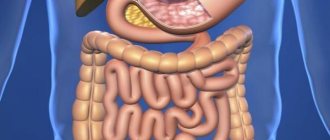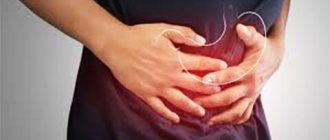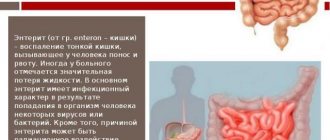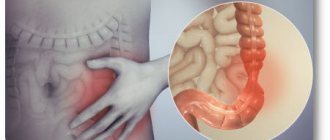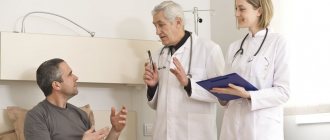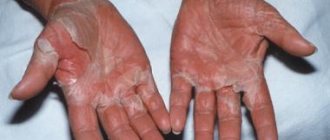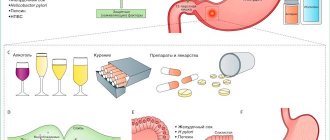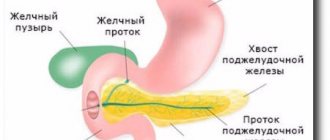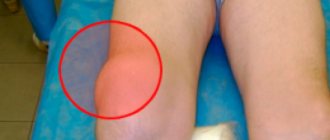Every fifth or sixth adult, if not more, constantly or occasionally, but quite regularly, notices discomfort in the abdomen, accompanied by changes in stool and flatulence. The sluggish process lasts for years, and in general allows you not to feel fundamentally sick, although such a life cannot be called complete health.
Our expert in this field:
Ozdoeva Tamara Akhmetovna
Gastroenterologist
Call the doctor
Most people get used to constant discomfort, but occasionally the pain intensifies and the person seeks medical help, even urgently calling an ambulance and being diagnosed with an “acute abdomen” go to the hospital.
As a rule, such a patient, already in the hospital emergency department, after a short examination, the suspicion of acute pathology of the abdominal cavity is removed, and he is sent home with a recommendation to follow a diet in connection with irritable bowel syndrome.
Polyclinic doctors ironically treat a diagnosis that has no obvious pathological basis, and do not burden the patient with therapeutic care, while the quality of his life leaves much to be desired.
So what is irritable bowel syndrome (IBS)?
A disorder of intestinal function, manifested by painful sensations in the abdomen that disappear after defecation. Stool with the syndrome differs in consistency from normal and all these troubles should be observed for at least six months, and in the last 3 months they should be observed monthly for three days in a row. This is how it is difficult to characterize this pathological condition, which supposedly does not have any pathological basis.
Signs
The most typical of them are the following:
- the appearance of a feeling of heaviness, which is concentrated in the lower abdomen;
- the same sensation localized in the navel area.
Symptoms of intestinal spasm also include constipation and its inverse process - diarrhea, as well as nausea, belching and flatulence. Vomiting, chills, headache, and cold sweats may be present.
In addition, thrombosis of small vessels and intestinal obstruction may occur. In this case, pain fills the entire peritoneal area. The abdomen becomes hard, and there is a feeling of fullness in the intestines, which does not disappear even after visiting the sanitary room.
Symptoms and treatment of intestinal spasms must be interrelated. It is necessary to identify what causes this disease and eliminate the cause that causes this symptom. To do this, you need to contact a gastroenterologist.
Why was the syndrome invented?
Irritable bowel syndrome was first described a hundred years ago as an increase in tone with a disturbance in peristalsis in one of the intestinal sections, which changed the overall movement of feces. All this arose in a practically healthy intestine, again in response to the completely natural movement of feces through it. It turned out that feces “spoiled” the intestine with its presence, and it reacted with even greater resistance to the movement of feces itself; in general, it turned out to be a vicious circle where it was impossible to understand what came first.
After 60 years, Dr. Manning’s group tried to isolate and combine common symptoms in order to systematize the diagnosis of irritable bowel syndrome, which doctors actively used for another 20 years.
But in the early 90s, at the European Gastroenterological Week, held in Rome, the International Working Group for the Study of Functional Pathology of the Gastrointestinal Tract decided to take the diagnosis of TBS into its own hands, and from that time on, objective Rome criteria for TBS began to be developed, which bring everything related to the syndrome into strict compliance with the achievements of medical science.
Diagnostics
Irritable bowel syndrome is not diagnosed during initial treatment; it is a diagnosis of exclusion, when a comprehensive full examination has been carried out, but no pathological changes have been found, only in this case can we talk about IBS.
Therefore, first of all, real diseases of the gastrointestinal tract will be excluded, for which they will do blood and stool tests for occult blood and calprotectin, culture it for intestinal bacteria, and conduct an ultrasound of the abdominal organs, gastroscopy and colonoscopy.
Causes of pathology
A weakened immune system is unable to resist infections.
The processes of the emergence of neuroses are still subject to study. However, doctors identify the causes of problems with the gastrointestinal tract. If it is possible to completely eliminate or minimize them, intestinal neurosis can be avoided. These reasons are called:
- emotional and psychological trauma;
- weak immunity and, as a result, a tendency to infectious diseases;
- intoxication;
- burdened heredity.
The greatest risk of developing intestinal neurosis is observed in people who experience conflicts at work, cannot find a place in the team and feel like “strangers”. There is a great danger in the case of a traumatic home environment. The risk group includes people experiencing sexual dissatisfaction. Intestinal neurosis syndromes are mainly characterized by:
- alcoholics;
- neurotics;
- people with congenital psychopathy.
Treatment of the syndrome and diet
When a patient is told that he has no pathological changes in the colon, but that everything is caused by altered bowel function, he even gets offended, suggesting that he is suspected of mental abnormalities. The psyche and the nervous system, of course, are connected by one brain, but still, mental pathological conditions are quite different from disorders of the peripheral nervous system. Irritable bowel syndrome is a functional disorder of the innervation of the intestines; it has nothing to do with madness.
As with any gastroenterological diseases, great importance is attached to the dietary regimen, so food becomes almost a cult: regular, measured and frequent, purely individual. With the exception of foods that provoke trouble, and, of course, it is expected to give up carbonated drinks and smoking.
For IBS with diarrhea, fruits and vegetables are limited and chewing gum is not recommended. With constipation, the opposite is true. Flatulence requires avoiding dairy products and cabbage with grapes, as well as animal fats - butter and lard.
The pain is relieved with antispasmodics, and first of all, no-shpa and drotaverine or baralgin. For diarrhea, taking loperamide (Imodium) and probiotics is indicated. For constipation, they begin and continue to fill their meals with fiber and drink plenty of fluids with high physical activity, and then they come to laxatives. Laxatives are a double-edged sword; on the one hand, these drugs help emptying, on the other, they accustom the intestines to laziness.
A specific drug, trimebutine, affects the entire complex of symptoms, but the issue of taking it should be discussed with your doctor. Not all probiotics are suitable, but with bacteria not lower than 109, so that the capsule is guaranteed to be absorbed not along the way, but in the intestines. According to clinical studies, cognitive behavioral therapy, hypnosis and psychological support have a very positive effect on the patient.
We will call you back
Leave your phone number
Forecast
In IBS, the prognosis is favorable in most cases. Adequate and timely therapy allows you to eliminate the pathology and completely restore the functioning of the digestive system. Proper treatment can eliminate the risk of relapse. Prognoses change when IBS symptoms are ignored or self-medicated. The syndrome can manifest itself in the early stages of many serious pathologies and mask them. The progression of pathological processes will lead to long-term therapy or surgery.
Mandatory manifestations of the syndrome
The defining criterion is abdominal pain, which must go away after defecation and be combined with a change in the consistency and frequency of stool. Gastroenterologists believe that normal stool should only be sausage-shaped, which is indicated by the Bristol stool shape scale. Balls and nuts, gruel and watery or liquid stools without hard lumps - this is completely wrong. Stool consistency is part of the Rome criteria for identifying irritable bowel syndrome. The next criterion is the frequency of bowel movements; normally it will be no more than three times a day and at least once every three days.
Folk remedies
Alternative medicine prescriptions are a good addition to the main treatment of IBS. Folk remedies cannot be used as the main way to eliminate pathology. Plant components improve the digestion process, but they cannot cope with some symptoms of irritable bowel syndrome (for example, pain, cramps).
Examples of folk remedies:
- infusion of pomegranate peels (combine a glass of boiling water and a tablespoon of the preparation, leave for several hours, take once a day before meals);
- baths with pine needles (you can use 500 ml of pine decoction or a few drops of essential oil in a standard bath, this method helps to relax and relieve tension);
- infusion of dill seeds (the seeds can be replaced with grass, the product is used for constipation, two cups of boiling water will require a tablespoon of the preparation, it is recommended to take the product in small portions throughout the day);
- infusion of peppermint (pour a teaspoon of raw material into a glass of boiling water, leave for fifteen minutes, take half a glass two or three times a day before eating).
Constipation and diarrhea
The pain must necessarily decrease after defecation, and is always accompanied by a change in the frequency and consistency of stool according to the principle - one criterion without the others is not considered IBS. Since the syndrome occurs due to deviations of intestinal motility from the norm, the development of both constipation and diarrhea is possible. Too active peristalsis leads to the rapid passage of food masses through the intestines without proper processing, which results in diarrhea. Sluggish and inhibited contractions lead to stagnation, that is, constipation.
The classification does not take into account the subjective manifestations of the syndrome - the intensity of pain, which is very dependent on the psychological type of the patient, but is based solely on its objective manifestations, namely, the nature of the stool. Diarrhea is loose stool, but not frequent stool; it is frequent stool, but not diarrhea. Constipation is infrequent passage of dense stool.
- Constipation syndrome, or “IBS-3” for short , includes not only constipation in this variant, since constipation alone is not enough in life, more than a quarter of all bowel movements should be hard feces and less than a quarter should be watery.
- Syndrome with diarrhea or “IBS-D” is the opposite: loose stools are more than a quarter of the acts, hard stools are less than a quarter.
- Mixed form - both consistencies separately take up less than a quarter of bowel movements.
- If it is impossible to attribute IBS to any of the specified forms, then it is assumed to be unclassifiable.
Our expert in this field:
Ozdoeva Tamara Akhmetovna
Gastroenterologist
Call the doctor
Where to go?
Many patients mistake the manifestations of the syndrome for the body’s reaction to a malnutrition, for ordinary indigestion, disorder, etc. And only after an appointment with a doctor and a competent diagnosis, they learn about the exact diagnosis and such a nuisance as IBS.
In order to timely diagnose and treat the disease, we recommend that you contact the nearest IMMA clinic. Gastroenterologists with many years of experience and modern equipment will help you make the correct diagnosis and prescribe individual therapy. You can make a pre-registration on our website or by calling our contact phone number.
How does irritable bowel manifest itself?
All symptoms of irritable bowel syndrome are very nonspecific, but still have some features that make it possible to make this particular diagnosis. The main thing is that all clinical manifestations do not have a pathological basis, but are caused solely by changes in contractions and relaxations of the intestines. All complaints with IBS can be grouped into three groups:
- intestinal,
- gastroenterological,
- non-gastroenterological.
Pain in the abdominal cavity is localized in the lower floor on the right, but more often it occurs on the left - in the iliac regions, but not necessarily below, maybe on the left under the ribs, but not behind the ribs, but in the area of the spleen. This pain almost goes away while lying down. The pain is very heterogeneous in nature, both dull and sharp, like a blow from a dagger or a burn, it can “twist” the intestines, or perhaps just a dull whining. After eating, the pain may intensify, necessarily decreasing after bowel movements and passing gas. Pain with IBS is not constant and does not bother you at night.
Diarrhea is predominantly morning, does not occur at night, at least twice in a short period of time. Often diarrhea does not leave a feeling of completeness of the act, and very persistently drives the person to the toilet. The consistency of the stool may vary, so in the first approach it is somewhat denser than in subsequent ones. But the volume of stool is normal, not like in infectious diseases, but in total no more than 200 grams.
For constipation, sheep feces or the first portion is like a dense plug, then mushy, without any impurities, but mucus is often present. Flatulence develops in the evening. These symptoms can occur with organic damage to the intestines.
What is not at all typical for ordinary intestinal diseases is a group of non-gastroenterological manifestations formed by unstable vegetation:
- headache,
- back pain,
- joint and muscle pain,
- internal trembling
- difficulty breathing.
Patients often note frequent urination at night and a feeling of insufficient emptying of the bladder, pain during sexual intercourse. Sleep disturbance is also possible. But all these symptoms are based, as it were, on a nervous basis, without an objective anatomical basis.
Take care of yourself, book a consultation now
Diagnostic measures
There is no special test for diagnosis, because there are no organic changes. Blood is taken for a general analysis - to identify leukocytosis and anemia, and a general analysis of stool is also taken to identify mucus and fat in it, as well as hidden bleeding. By the way, the presence of fatty acids in feces indicates pancreatitis.
The level of thyroid hormones is determined. For lactase intolerance, a stress test is performed. Gastroscopy, irrigoscopy, colonoscopy and sigmoidoscopy are indicated. To exclude other symptoms, a CT scan of the abdominal cavity and pelvic organs may be prescribed.
Why does the syndrome occur?
No one can yet name one reason leading to the development of irritable bowel syndrome; probably, there is no one main reason. The condition is believed to be based on an inadequate response of the colon mucosa to ordinary human stress; in all likelihood, genetics are to blame for this, causing some distortions. In IBS, an increased reaction to the presence of stress levels of hormones in the blood is revealed, when the sensitivity of the receptors located in the muscle cells of the intestine is greater than necessary, which is why it reacts with pain when the intestine is stretched by feces.
There is an opinion about the effect of acute intestinal infection predisposing to hypersensitivity. So, every third or fourth patient develops irritable bowel syndrome after an intestinal infection. During infection, bacterial and viral agents damage the nerve formations inside the intestinal lining that ensure its contractions—the enteric plexuses. Inflammatory mast cells, which carry out immune responses, accumulate near these plexuses, releasing products such as histamine and the enzyme tryptase. Excess concentrations of these substances are found in irritable bowel syndrome.
It has been noted that the syndrome occurs after abdominal surgery, especially after removal of the appendix and gallbladder, and in half of women who have lost their uterus as a result of hysterectomy. There is an assumption about the important role of prostaglandin E, which initiates abdominal pain and changes in stool in the first days of menstruation.
Mechanism
Contraction of the intestine occurs by peristaltic waves, in which the muscular system of its various parts works alternately, starting from the duodenum and up to the sigmoid colon. In the rectum, such movements are not observed, since food is pushed towards it with the help of the above-mentioned waves. In addition, pendulum-like contractions and rhythmic segmentation are observed in this organ. With the help of the latter, the lump of food is mixed. Pendulum-like contractions contribute to its multidirectional movement, as a result of which it moves towards the rectum.
Spasm is a disease that is a symptom of other gastrointestinal diseases. It can go away on its own after the corresponding gases have passed or after a single visit to the sanitary room. If this does not happen, you need to consult a doctor.
Poor nutrition
Equal importance is given to eating disorders, because a good effect is noted with a balanced diet as a treatment for the syndrome. It is believed that a normal person should have a bowel movement in the morning after breakfast. Refusal of the traditional morning meal, which was established by our ancestors and passed on to us with genes, does not contribute to the preservation of the morning bowel reflex, provoking constipation and the development of irritable bowel syndrome.
The main thing is that in all cases the intestine could be considered healthy if it could work properly when it needs to contract and when it needs to relax, which for some unknown reason it cannot do.
With the syndrome, there is no risk of developing cancer and other intestinal diseases, but there is a frequent combination of IBS with gastritis, which today is called functional dyspepsia and reflux disease.
The material was prepared by Tamara Akhmetovna Ozdoeva, a gastroenterologist at Medicine 24/7.
Prevention
Prevention means:
- rejection of bad habits;
- breathing and physical exercises;
- walks in the open air;
- power control;
- eliminating the cause of nervous tension, controlling your own emotions.
Intestinal neurosis can be avoided if you lead a healthy lifestyle and exercise regularly. Swimming is useful. For those who experience stress, a relaxing massage is recommended. But the main thing lies in the person himself and his attitude to the world around him. Don't be nervous about anything - health is more important.
